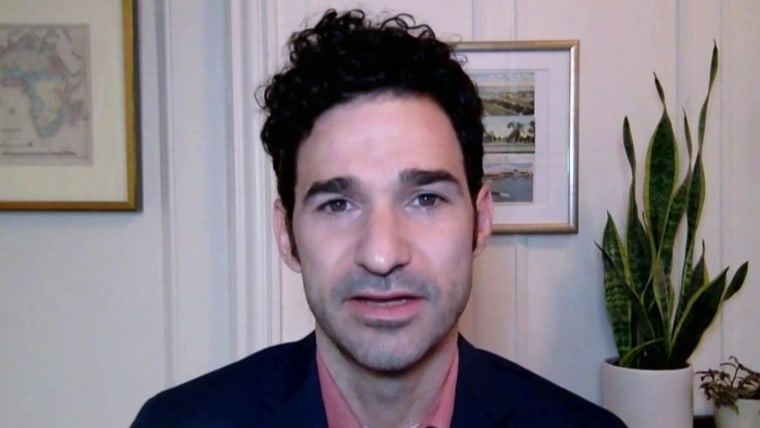Whether the Trump administration’s guidance to reopen portions of the country achieves success hinges on diagnostic testing: people need to know whether they’re healthy sufficient to return to work, or ill with COVID-19 and need continued isolation.
It’s a need Vice President Mike Pence acknowledged during a coronavirus task force briefing Thursday at the White House.
Full protection of the coronavirus outbreak
” Our administration will continue to work day in and day out,” he said, “to ensure that our states have not only the medical supplies, but that we continue to rapidly expand screening across the country.”



However medical care physicians throughout the nation state they have nowhere near the level of screening supplies needed to fulfill what is sure to be increased need for coronavirus testing.
” We’re here on the cutting edge of this doggone thing,” Dr. Gary LeRoy, president of the American Academy of Family Physicians, told NBC News. Patients naturally rely on their medical care physicians initially when they are ill, making it important those practices have access to testing packages.
But in a survey of 2,602 family physicians across the country, one third said they had no capability to test for COVID-19, the disease brought on by the virus. The study was released Friday from the Primary Care Collaborative, a not-for-profit organization for medical care groups, and a research group called the Larry A. Green Center.
Another third reported having only minimal capability for diagnostic screening. Majority reported an absence of individual protective equipment.
” We are worried,” LeRoy, who is also a practicing physician at the East Dayton Health Clinic in Dayton, Ohio, stated, including that accurate screening is the crucial to understanding asymptomatic spread of the coronavirus, also.
” If you start evaluating more, you would find that you actually have more people walking believing that they don’t have this,” LeRoy stated. “They’re Trojan horses bring this virus from individual to individual to individual to person.”
Let our news satisfy your inbox. The news and stories that matters, delivered weekday early mornings.
” You require to understand how many Trojan horses you have out there prior to you open things up.”
You need to know the number of Trojan horses you have out there before you open things up.
Private laboratories are increasingly able to offer testing, according to the American Scientific Lab Association, a market trade group.
However, those labs are still mainly faced with scarcities of products, such as screening swabs and chemical reagents, and are for that reason not able to do mass screening of asymptomatic individuals in the general public.
In the Washington, D.C., location, AllCare Household Medicine has actually handled to establish numerous drive-thru screening sites for its clients, though finding adequate materials has not been easy.
Personal protective equipment and even televisions required to store swab samples ended up being “really hard to come by,” Victor Zakaryan, medical director for AllCare Family Medicine, stated.
Zakaryan stated his group was not able to get enough equipment from regional health departments, turning instead to private business and importing gowns and masks essential to keep clinicians safe while performing the nasal swab screening.
” Prior to we began the screening, we had a number of nights that we didn’t sleep to come up with the testing protocol,” he stated. “If we were going to do this, we had to get it right.”
Download the NBC News app for full protection of the coronavirus break out
But numerous doctors’ offices acknowledge that they can’t do the testing themselves. Rather, they’re trying to screen clients for COVID-19 symptoms well prior to patients get here for visits– and after that send them in other places.
Clients of Atrium Health System in Charlotte, North Carolina, should address a series of questions about their health status prior to making a visit, an effort to triage prospective coronavirus clients to special drive-through screening not carried out in workplaces.
It’s the same scenario on the West Coast, where some family physician state they stay hectic with regular clients, in spite of an inability to evaluate for the coronavirus.
” We don’t do COVID screening because of safety. We’re just using masks and gloves,” Dr. Rajsree Nambudripad, a primary care physician at St. Jude Medical Center in Fullerton, California, stated.
” We do not have that high level of safety for ourselves.” If Nambudripad figures out a patient needs to be evaluated for COVID-19, she advises a journey to the healthcare facility or an immediate care center.
Making these triage decisions more difficult for physicians is that the requirements for which patients should be evaluated modifications daily. New prospective signs emerge constantly; now including queasiness, diarrhea, delirium, even skin changes.
And there is no single set of constant requirements; it can be various at each healthcare facility system, local health department or state health department.
LeRoy, the AAFP president, stated he got up recently to 3 new pages of testing requirements. “You lastly enter your head what to do and how to order the test, and now here’s 3 pages of stuff you have to read to determine how to appropriately purchase the screening.”
” I don’t have time to read all this things,” he stated.
Follow NBC HEALTH on Twitter & Facebook.

